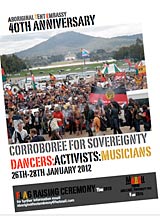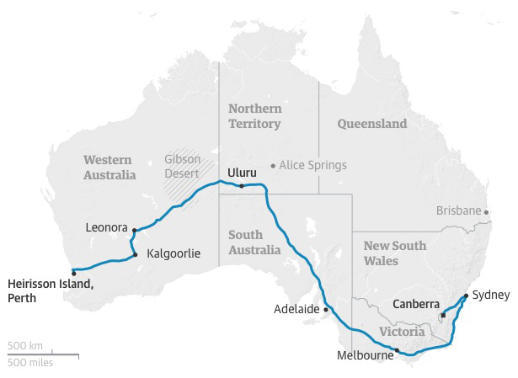Aboriginal timeline: Protest
Found 43 results for your search. Showing page 2 of 3.
1982
-
Queensland Aboriginal people protest at the Commonwealth Games.
1985
-
In the ‘Come to Canberra Campaign’ joint land councils from the Northern Territory and the States go to Parliament House, Canberra to protest against the proposed changes to the Aboriginal Land Rights Act of the Northern Territory and the inadequate provisions in Labor Prime Minister Bob Hawke’s visions of ‘Uniform National Land Rights’.
1988
-
Sydney activist Burnum Burnum (Harry Penrith) plants the Aboriginal flag on an English beach to claim Britain for the Aboriginal people.
-
Tens of thousands of Aboriginal and Torres Strait islander people march through the streets of Sydney on Australia Day to celebrate their survival during the previous 200 years, while non-Aboriginal Australia commemorates the bicentenary of their immigration. Aboriginal people rename the day ‘Survival Day’.
1992
-
The first Survival Day concert is held in Sydney.
2000
-
An Aboriginal Tent Embassy is set up in Sydney during the Olympic period to attract world media attention to Australian Indigenous issues.
2004
-
Michael Long, a former Australian Rules footballer of partial Aboriginal decent, sets out on foot from Melbourne to Canberra to speak to Prime Minister John Howard and raise awareness of the plight of Aboriginal Australians. His walk becomes known as The Long Walk.
2010
-
Veteran Aboriginal rights activist, Charles ‘Chicka’ Dixon, dies aged 81. Dixon was active in the Federal Council for the Advancement of Aborigines and Torres Strait Islanders and its campaign for the 1967 national referendum. Dixon was also active in the Aboriginal Tent Embassy movement in the 1970s and a major player in establishing Australia’s first Aboriginal legal and medical services. He received a state funeral on March 31st.
2012
-

40th anniversary of the Aboriginal Tent Embassy. The Aboriginal Tent Embassy in Canberra celebrates its 40th anniversary. An incident where the Prime Minister was disturbed by around 50 protesters outside a restaurant makes security guards drag her hurriedly into a car. She loses a shoe, gaining her the nickname ‘Gingerella’ (alluding to Cinderella and PM Julia Gillard’s red hair). Media reports grossly exaggerate the events.
-
Between March and April, Aboriginal people set up tent embassies in Brisbane, Moree and Perth to draw attention to issues such as sovereignty and native title.
-
After widespread outrage and a petition signed by 20,337 people Facebook removes a page of Aboriginal memes which portrays Aboriginal people as drunks who sniff petrol and bludge on welfare.
2015
-
Aboriginal people commence a sit-in in Canberra at Parliament House to confront politicians about the state of Aboriginal affairs around the country. They demand that the Commonwealth of Australia begins negotiations towards decolonisation with the goal of healing from the “devastation wreaked upon Aboriginal Nations and Peoples” by violations of human rights.
-
Aboriginal activist Faith Bandler dies, aged 96. She was a tireless social activist, best known for her 10-year campaign leading the landmark 1967 referendum that ensured Aboriginal Australians were counted as full citizens.
-
Thousands of people rally in cities and towns around Australia protesting against the planned closure of around 150 remote Aboriginal communities in Western Australia.
2016
-
Aboriginal leaders come together to announce the Redfern Statement, an urgent call for a more just approach to Aboriginal Affairs and government action. Read the statement
2017
-
The Co-Chairs of the National Congress of Australia’s First Peoples and prominent Aboriginal leaders from across Australia formally present the Redfern Statement to parliamentary leaders in Canberra.
-
Teenager and Gumbaynggirr woman Aretha Brown is chosen by 60 peers as the first female Aboriginal Youth Prime Minister of Australia at the National Youth Parliament in Canberra. In this role she meets Prime Minister Malcolm Turnbull, Opposition leader Bill Shorten and the Governor General Sir Peter Cosgrove.
-
Clinton Pryor arrives at Parliament House in Canberra after walking 5,800 kilometres from Perth (WA). Called ‘Spirit Walker’, he had started his year-long walk to highlight the situation of Aboriginal people and meet with the Prime Minister to present him with a list of grievances about the state of Aboriginal affairs.

Clinton Pryor walked across the length of Australia to protest the state of Aboriginal affairs but politicians only received him outside Parliament House.
2019
-
12-year-old Arrernte and Garrwa boy Dujuan Hoosan from central Australia, star of the acclaimed documentary, In My Blood It Runs, becomes the youngest person to ever address the UN Human Rights Council. In his short speech he shares his own experiences with the youth justice system and calls for support for Aboriginal-led education models. [2]
I want my school to be run by Aboriginal people. I want adults to stop cruelling 10-year-old kids in jail. I want my future to be out on land with strong culture and language.
— Dujuan Hoosan in his speech to the UN

